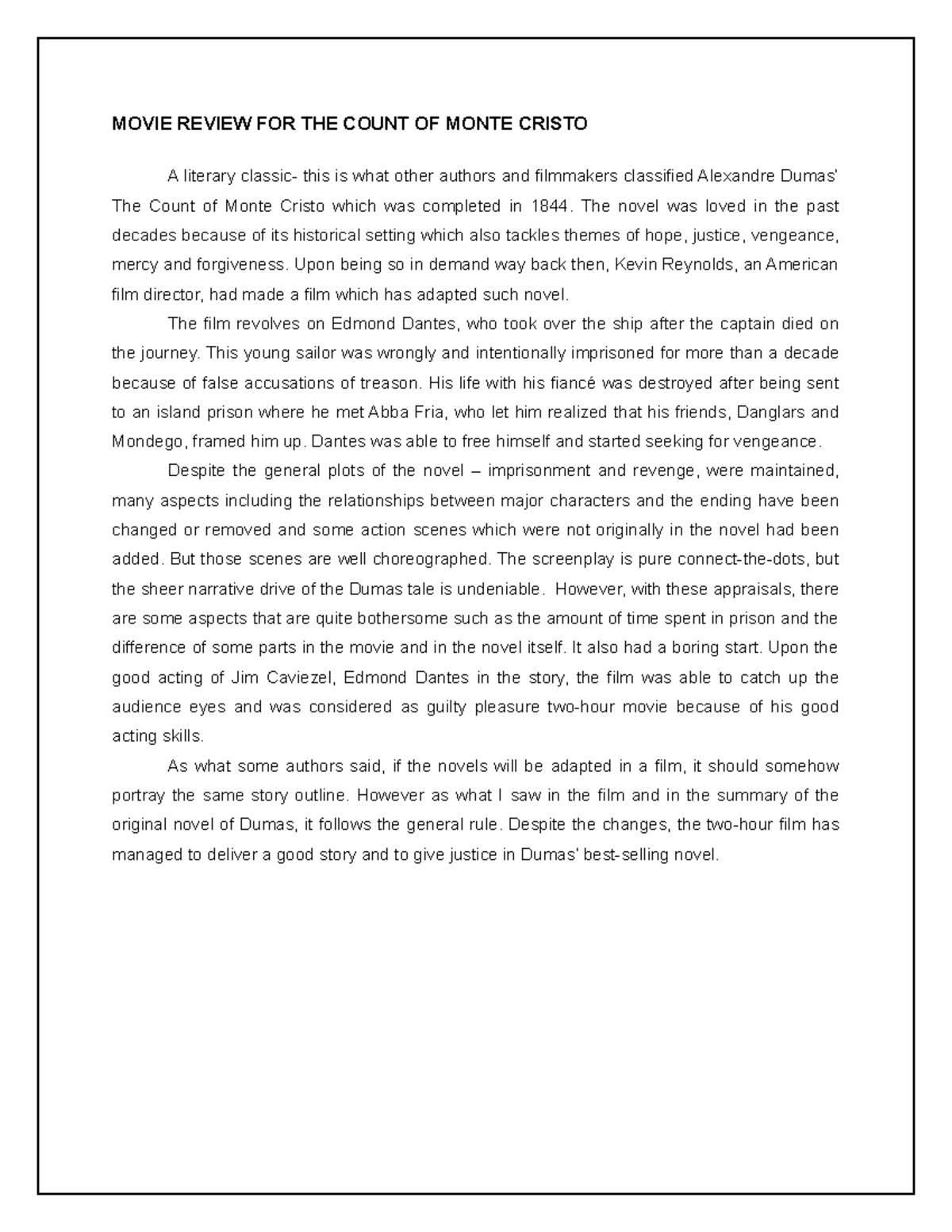Is The Count Of Monte Cristo Still Relevant Today? A Critical Review

Table of Contents
Themes of Revenge and Justice in a Modern Context
The Allure of Revenge
The human fascination with revenge narratives is timeless. Edmond Dantes's quest for retribution in The Count of Monte Cristo taps into our primal instincts and explores the complex ethical dilemmas inherent in seeking vengeance. The allure of revenge, the desire to see wrongdoers punished, is a potent force, fueling countless stories across different cultures and eras.
- Examples in modern media: From the meticulously planned revenge in Kill Bill to the morally ambiguous actions of Walter White in Breaking Bad, revenge remains a central theme in contemporary storytelling. Even seemingly lighthearted fare, like John Wick, explores the intricacies of revenge.
- Ethical dilemmas: Dantes's actions raise crucial questions. Is revenge ever truly justified? What are the consequences of prioritizing retribution over forgiveness? The novel forces us to confront the moral ambiguity of seeking justice through violent means.
- Comparison with modern justice: Dantes's methods stand in stark contrast to modern legal systems, highlighting the imperfections and limitations of formalized justice. His extrajudicial actions raise questions about the efficacy and fairness of our legal frameworks.
Justice Delayed, Justice Denied?
The Count of Monte Cristo offers a scathing critique of the judicial system. Edmond Dantes's wrongful imprisonment serves as a powerful commentary on corruption, systemic biases, and the failures of due process – issues that remain painfully relevant today.
- Modern instances of injustice: Wrongful convictions, police brutality, and unequal access to legal representation continue to plague modern societies, echoing the injustices faced by Dantes. The Black Lives Matter movement and ongoing discussions about criminal justice reform highlight the continued need for systemic change.
- Critique of power structures: The novel exposes the corrupting influence of power and the ways in which those in authority can manipulate the system for their own gain. This critique remains strikingly relevant in our own times, where political scandals and corporate corruption regularly make headlines.
- Effectiveness of Dantes's methods: While Dantes achieves a form of justice, his methods are undeniably brutal and raise questions about the true cost of revenge. Does his triumph ultimately justify the suffering he inflicts? The novel doesn't offer easy answers.
Exploring Enduring Character Archetypes
The Anti-Hero's Journey
Edmond Dantes's transformation is a masterclass in character development. His journey from innocent victim to calculating avenger resonates with modern depictions of anti-heroes, characters who are morally ambiguous yet compelling.
- Comparison with modern anti-heroes: Think of characters like Dexter Morgan or Tony Soprano. Like Dantes, these anti-heroes are capable of great cruelty yet possess certain qualities that elicit sympathy or even admiration.
- Moral ambiguity and audience response: The novel expertly explores the complexities of Dantes's character, challenging our own moral judgments. We empathize with his suffering, yet we grapple with the brutality of his revenge.
- Complexities of his character arc: Dantes's transformation is not linear. He wrestles with his own demons and undergoes profound personal change. This complexity makes him a far more engaging and thought-provoking character than a simple, straightforward hero.
The Power of Betrayal and Friendship
Betrayal and loyalty are recurring themes that lend The Count of Monte Cristo its emotional depth. The novel explores the fragility of human relationships and the enduring power of true friendship in the face of adversity.
- Betrayal and friendship in contemporary society: These themes remain highly relevant, exploring the complexities of relationships in the modern world, where trust and loyalty can be easily tested.
- Different types of relationships: The novel depicts various relationships, from the intense loyalty of Danglars's betrayal to the enduring friendship with Fernand Mondego's deceit. These different dynamics add layers to the narrative.
- Impact of betrayal on Dantes: Dantes's experiences shape his actions and fuel his desire for revenge. The novel shows how profound betrayal can reshape a person's life and alter their perspective on the world.
The Count of Monte Cristo's Enduring Literary Merit
Masterful Storytelling and Narrative Techniques
Dumas's skill as a storyteller is undeniable. His mastery of suspense, plot twists, and character development keeps readers enthralled from beginning to end. The Count of Monte Cristo's enduring appeal lies partly in its masterful construction.
- Narrative techniques: Dumas expertly employs flashbacks, foreshadowing, and cliffhangers to maintain reader interest. The pacing is expertly managed, balancing moments of intense action with periods of quiet reflection.
- Pacing and structure: The intricate plot, with its multiple interwoven storylines, is a testament to Dumas's skill in maintaining momentum and coherence.
- Influence on subsequent literature: The novel's influence on subsequent works of literature is undeniable, shaping the genre of adventure and revenge tales for generations.
Social Commentary and Historical Context
The Count of Monte Cristo is more than just a thrilling adventure story; it's a sharp social commentary on wealth, power, and class inequality. The themes explored in the novel remain profoundly relevant today.
- Social commentary: The novel critiques the excesses of wealth, the corrupting influence of power, and the pervasive inequalities of 19th-century French society. These critiques remain strikingly pertinent to modern society, highlighting ongoing issues of wealth disparity and social injustice.
- Historical context: Understanding the historical context of the novel enriches the reading experience. The Napoleonic era and the social and political upheavals of the time provide a rich backdrop to the narrative.
- Relevance to modern social issues: The novel's exploration of social inequality, political corruption, and the abuse of power continues to resonate with modern audiences, prompting reflection on our own societies.
Conclusion
The Count of Monte Cristo remains relevant today because its themes – revenge, justice, betrayal, friendship, and social commentary – continue to resonate with readers. Dumas's masterful storytelling and insightful exploration of the human condition ensure the novel's enduring appeal. The novel's exploration of justice, both its pursuit and its shortcomings, feels particularly relevant in our modern world. It serves as a powerful reminder of the enduring power of human relationships and the enduring struggle for fairness. Rediscover the timeless power of The Count of Monte Cristo and explore its continued relevance today. Is The Count of Monte Cristo's message of justice and revenge still echoing in our modern world?

Featured Posts
-
 Darjeeling Traffic Congestion Causes And Solutions
May 04, 2025
Darjeeling Traffic Congestion Causes And Solutions
May 04, 2025 -
 Wb Weather Forecast Thunderstorms Expected In Kolkata And Nearby Areas
May 04, 2025
Wb Weather Forecast Thunderstorms Expected In Kolkata And Nearby Areas
May 04, 2025 -
 Dzhidzhi Khadid I Kuper Pravda Ob Ikh Otnosheniyakh
May 04, 2025
Dzhidzhi Khadid I Kuper Pravda Ob Ikh Otnosheniyakh
May 04, 2025 -
 Ant And Dec Reveal Significant Alterations To Britains Got Talent Following Recent Problems
May 04, 2025
Ant And Dec Reveal Significant Alterations To Britains Got Talent Following Recent Problems
May 04, 2025 -
 U S Electric Motor Development Countering Chinas Influence
May 04, 2025
U S Electric Motor Development Countering Chinas Influence
May 04, 2025
